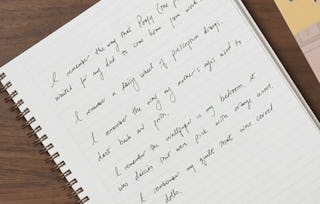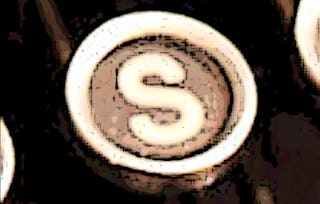Why just write poems when you can write better ones? This course is built on the notion that the most exciting writing begins after the first draft. It is specifically for folks who believe that writing poems just to express oneself is like using the Internet just for email. After all, poetry can change the way you and your readers think of the world and its inhabitants; it can break new ground for language; turn a blank sheet of paper into a teeming concert of voices and music.

Sharpened Visions: A Poetry Workshop

Sharpened Visions: A Poetry Workshop

Instructor: Douglas Kearney
151,130 already enrolled
Included with
1,880 reviews
Skills you'll gain
Details to know

Add to your LinkedIn profile
See how employees at top companies are mastering in-demand skills

There are 6 modules in this course
Poetry orchestrates its music, arguments, tensions, and environment via arrangements of language into lines and stanzas. This week we’ll address the importance of the line break, perhaps the most conspicuous, signature tool in the poet’s toolkit. Do you break more for sound, for sense, visual effect, shape, a mix of several? We’ll participate in several line break exercises and remix found poems. Also: prepare for your first quiz and a fun first writing prompt.
What's included
8 videos6 readings1 assignment
Abstraction doesn’t mean “deep,” and image doesn’t mean “picture.” Images are typically understood as anything you can literally touch/taste/see/hear/smell, and abstractions are those things for which we have symbols (a clock for “time,” a heart for “love”) but no image. Abstractions and images may fill our poems, but how can you tell what’s what, and how can you leverage them to compelling ends? This week we’ll work at finding new symbols to replace clichéd ones for abstractions and we’ll work at crafting images that do more than add furniture to a poem, but create systems of relationships, moods, and even style.
What's included
5 videos1 reading1 assignment
Most of us think of simile and metaphor, personification and other similar figures of speech as being about similarities between objects, concepts, and entities. But the juice in these formulas comes from how different the two things being compared seem to be. This is why writing: “the shark moved like a fish” is, alone, a lot less interesting than saying “the shark moved like a squad car.” We’ll talk about how playing with difference via juxtaposition can create a range of poetic effects. Then you’ll write a poem built of one robustly developed or several contrasting juxtapositions. We'll end this module with yet another quiz, and our first poetry workshop -- facilitated through a peer assessed assignment.
What's included
5 videos1 reading1 assignment1 peer review
This week we’ll explore how rhyme leverages patterns of sameness and how we can estrange similarity for compelling poetic effects. We’ll check out examples of “rhyme”—sonic, visual, conceptual—from outside of poetry too.
What's included
5 videos1 reading1 assignment
All spoken language has rhythm, the trick is working the rhythm in such a way that drives your poem toward the effects you’re after. Maybe you want a fluid, seductive, propulsive rhythm. Perhaps something that halts or stutters. We’ll use traditional western concepts of meter as a means to open the door to this discussion, but we may leave them at the door upon entry.
What's included
6 videos1 reading1 assignment1 peer review
When you revise a poem, you are not trying to dull the emotional flash of your first draft. You must, instead, intensify it. In this, our final week, we’ll discuss the difference between revision and editing, the art of reading your own work critically, and the beauty of drafts. For your final peer review, you’ll turn in (and in turn, assess) a revision of one of the poems from the preceding 5 modules.
What's included
11 videos1 reading1 peer review
Instructor

Offered by
Explore more from Music and Art
 Status: Free Trial
Status: Free Trial Status: Preview
Status: PreviewUniversity of Illinois Urbana-Champaign
 Status: Free Trial
Status: Free TrialWesleyan University
 Status: Free Trial
Status: Free Trial
Why people choose Coursera for their career

Felipe M.

Jennifer J.

Larry W.

Chaitanya A.
Learner reviews
- 5 stars
83.08%
- 4 stars
13.56%
- 3 stars
1.86%
- 2 stars
0.58%
- 1 star
0.90%
Showing 3 of 1880
Reviewed on May 14, 2022
This course does a good job in covering the basics andpresenting you with interesting prompts. The workshop aspect really allows you to receive feedback which can be difficult to find elsewhere.
Reviewed on Feb 1, 2024
Wonderful course! The opportunities for feedback were extremely helpful, and Douglas Kearney made the material easily accessible and understandable as well as entertaining. Highly recommend.
Reviewed on Aug 29, 2021
Very in-depth analyses of beautiful, professional poems really showed me how it's done. Funny professor, many tips and tricks for my own works, and great practice exercises for applying lessons!

Open new doors with Coursera Plus
Unlimited access to 10,000+ world-class courses, hands-on projects, and job-ready certificate programs - all included in your subscription
Advance your career with an online degree
Earn a degree from world-class universities - 100% online
Join over 3,400 global companies that choose Coursera for Business
Upskill your employees to excel in the digital economy
Frequently asked questions
To access the course materials, assignments and to earn a Certificate, you will need to purchase the Certificate experience when you enroll in a course. You can try a Free Trial instead, or apply for Financial Aid. The course may offer 'Full Course, No Certificate' instead. This option lets you see all course materials, submit required assessments, and get a final grade. This also means that you will not be able to purchase a Certificate experience.
When you purchase a Certificate you get access to all course materials, including graded assignments. Upon completing the course, your electronic Certificate will be added to your Accomplishments page - from there, you can print your Certificate or add it to your LinkedIn profile.
Yes. In select learning programs, you can apply for financial aid or a scholarship if you can’t afford the enrollment fee. If fin aid or scholarship is available for your learning program selection, you’ll find a link to apply on the description page.
More questions
Financial aid available,
¹ Some assignments in this course are AI-graded. For these assignments, your data will be used in accordance with Coursera's Privacy Notice.

